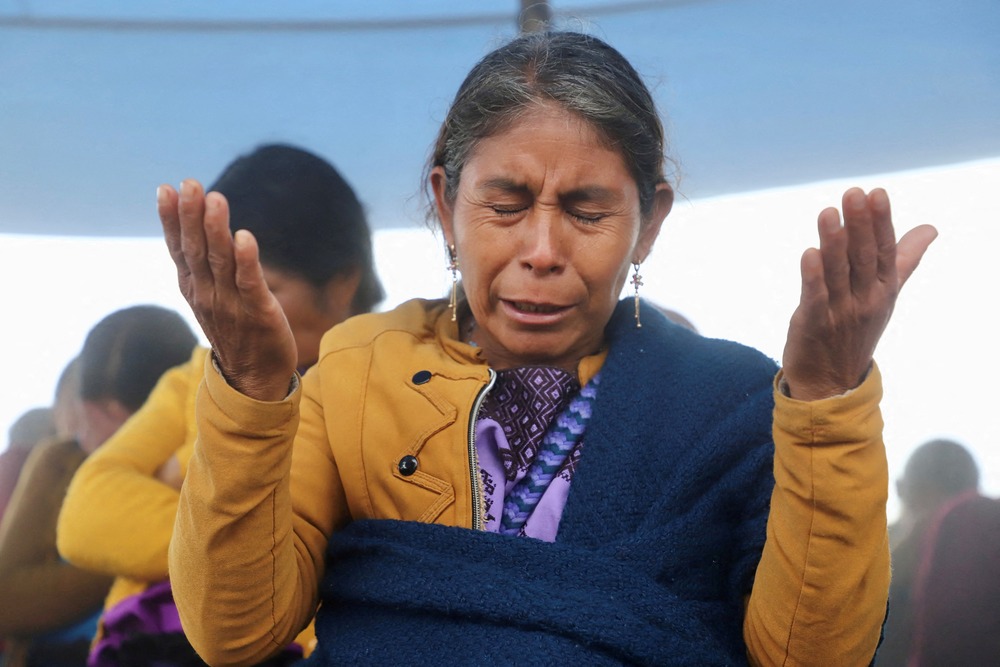
A Tzotzil Indigenous woman prays Oct. 6, 2022, in the village of Majomut in the Mexican state of Chiapas, Mexico, after villagers were displaced from their town of Santa Martha because of a confrontation over land between two armed groups in Santa Martha, a municipality of Chenalho in Chiapas. (OSV News/Jacob Garcia, Reuters)
Hundreds of Mexicans have fled drug cartel violence in southern Chiapas state to neighboring Guatemala, causing the bishop of a Mexico border diocese to ask local authorities: "How long will they live trying to hide a sad and painful reality that we carry day by day?"
The trend is a reversal of past decades, when Indigenous Guatemalans fleeing genocide and civil war sought shelter in Mexico.
Guatemala President Bernardo Arévalo told reporters July 24 that nearly 600 Mexicans have entered the country and are being provided shelter in the municipality of Cuilco, near the international border.
"They are escaping the confrontation between groups taking place on the Mexican side," he said.
The Associated Press reported that residents fled Mexico due to a lack of food and conflict near their communities. The news agency also reported the Chiapas public security secretariat saying it had not received reports of displacements in the area.
Catholic leaders have denounced widespread insecurity in Chiapas, Mexico's poorest state, where two of the country’s main drug cartels — the Jalisco New Generation Cartel and Sinaloa Cartel — are disputing territory used for smuggling drugs and human trafficking.
The outgoing bishop of a Mexican border diocese, meanwhile, questioned the inaction of state and federal authorities in the face of a raging drug cartel in Chiapas, where illegal roadblocks are rife, villages have emptied and locals have fled forced recruitment.
"Brothers of the civil authority of the different levels of government, we continue to wait for you to intervene to do what corresponds to you: Restore the rule of law in our communities," said Archbishop Jaime Calderón Calderón, currently apostolic administrator of the Diocese of Tapachula in Chiapas where he had been bishop since 2018. (On July 4, he was named archbishop of León in the Mexican state of Guanajuato and will be installed there Aug. 19.)
"What do you need to get out of his indifference and defend the people who trusted you with their vote so that you will take care of him?" Calderón said in a July 24 statement. "How long will they live trying to hide a sad and painful reality that we carry day by day?" the archbishop-designate asked.
Calderón spoke of "the permanent presence of drug cartels, disputing territory" in a mountainous region of the diocese he's now leaving, which borders Guatemala, "coming and going throughout the territory in the face of indifference and apparent complicity from the National Guard and the Mexican military (and) with the apparent complicity of the federal and state governments."
People, he said, are "being intimidated, threatened and forced to participate as human shields in the confrontations of the drug cartels."
Advertisement
Outgoing Mexican President Andrés Manuel López Obrador has repeatedly downplayed or denied the violence occurring in Chiapas and other parts of Mexico, claiming that the media were sensationalizing the situation to make his government look bad. He has also told Chiapas residents not to flee and to trust in the local authorities.
"In five years we have not had serious insecurity problems in Chiapas," López Obrador said May 15.
Violence in Chiapas had little electoral impact on his prótegé, President-elect Claudia Sheinbaum, who claimed nearly 80% of the vote in the state.
Jesuit Father Pedro Arriaga, who ministers in rural Chiapas, told OSV News many in state believe they benefited from social programs introduced by the president such as stipends for seniors and favored the president's megaprojects in the country's southeast, such as a railway running from Palenque — the site of impressive Mayan ruins — to Cancuén and circling the Yucatán Peninsula. They also don't blame the president for insecurity, he said.
The violence in Chiapas has proved treacherous for migrants and Guatemalans doing business in the state.
The families of 10 Guatemalan merchants, who disappeared in Chiapas in 2023, recently traveled to the state in search of their missing loved ones.
"Mexican authorities have not carried out a diligent investigation to find the whereabouts of our missing relatives, and they have been negligent in addressing our needs," the families said in a July 22 statement issued by the Fray Bartolomé de las Casas Human Rights Center and the Jesuit Network with Migrants - Guatemala.
The merchants disappeared after Nov. 16, 2023, shortly after crossing into Mexico, through a municipality consumed by drug cartel violence, according to the statement.








